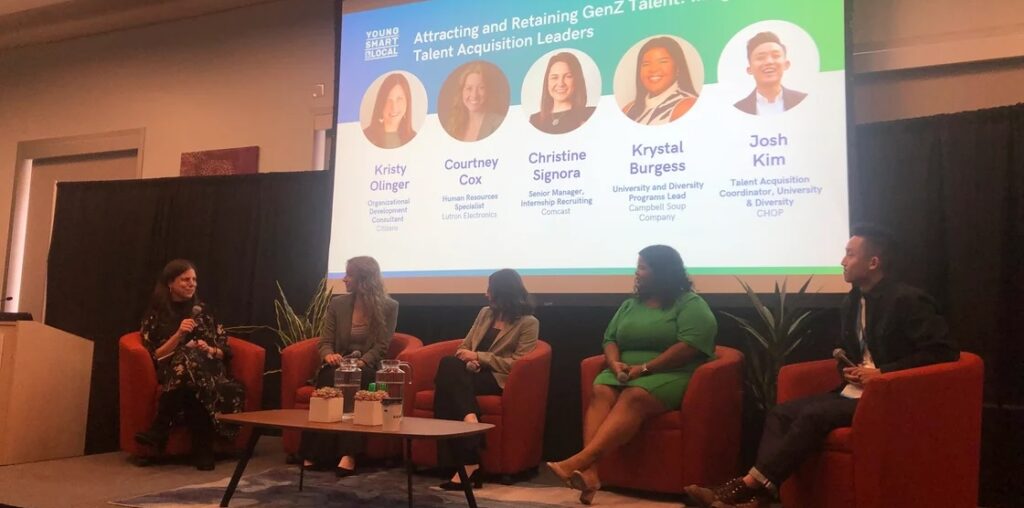The next generation of talent is entering the workforce, and employers are adjusting their strategies to attract and retain Gen Z employees.
At the 2024 Young Smart & Local conference, hosted by Campus Philly in early November, a panel of local HR professionals discussed how this tech-savvy, socially conscious group is reshaping hiring and workplace practices.
Read on for early-career recruiting insights from Comcast, Campbell’s Soup Company, Children’s Hospital of Philadelphia (CHOP) and Lutron Electronics.
Prioritize human connection, fair compensation and meaningful work
Gen Z emphasizes work-life balance, fair compensation and building professional connections, said Christine Signora, a senior manager of internship recruiting at Comcast. So, the Philly-based global media and entertainment company trains its managers to recognize these issues as important to the hiring process.
Human connection is another issue of top importance to today’s young adults, said Courteney Cox. An HR specialist at Philadelphia lighting control firm Lutron Electronics, she noted that extends to the hiring process itself.
“One thing that Lutron is leading more into right now is building human connections,” Cox said. “We’ve completely done away with some of the pre-recorded screening.”
Gen Z also places a high value on flexibility and meaningful work, said Krystal Burgess, university and diversity programs lead at Camden-based Campbell’s Soup Company. She highlighted that young professionals want to contribute to impactful projects and set boundaries to pursue their personal lives and interests.
“They have boundaries that they want to stick to and want an employer that respects that,” Burgess said. “The second thing that they’re looking for is compensation, making sure that they’re paid fairly for the work that they’re doing.”
Invest in fostering early-career talent requires resources
One challenge employers face is convincing senior leadership to invest in early career talent, said Josh Kim, talent acquisition coordinator at CHOP, because leaders don’t always see the immediate value. Companies prioritize hiring senior roles instead because of their proven and established technical skills.
“Internally, we have to track all of our data, because we need to show [leadership] that we have this amazing externship program, fellowship program, co-op program,” he said.
Recognizing that higher education can be a barrier for some, CHOP is developing programs to engage community college students, putting them on a pathway to work for the hospital and pursue further education, Kim explained.
Campbell’s has focused on getting the new workforce in the door by converting interns to full-time employees.
“It’s important to have leadership see Gen Z as the next generation of leaders,” said Burgess, the diversity programs lead. “If we can bring them in and train them and support them through their growth and development, then they can take over these leadership roles way quicker.”
Beyond hiring, companies are prioritizing networking and resources to support early career talent — and making sure to show that off to potential new hires.
Comcast intentionally features students in its branding to show what it’s like to work at the company, said Signora, the recruiting manager. And even if interns don’t stay long-term, the company invests in their professional development as part of its programming.
Lutron takes a similar approach, according to HR specialist Cox, staying connected with program alumni and appointing campus managers to build human connections with students. For smaller companies without resources for robust internship programs, Cox suggested engaging with students one-on-one and inviting them to learn more about the company.
The panelists agreed on four key takeaways for recruiting young talent: be authentic, proactive, culture-focused and empowering. These traits resonate with a generation that values transparency and purpose.

